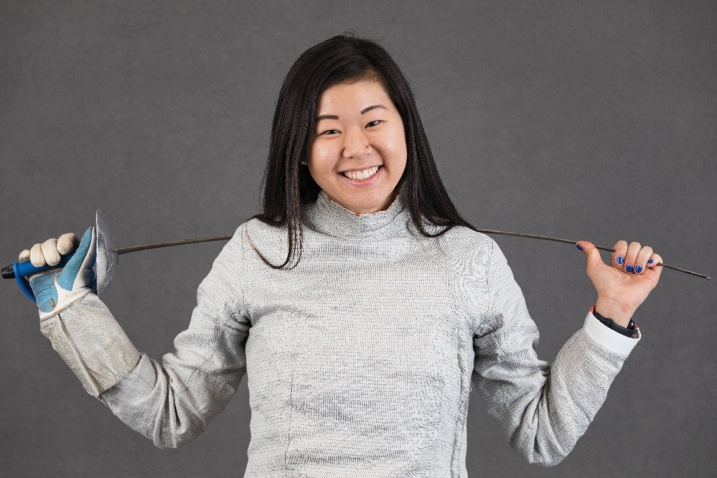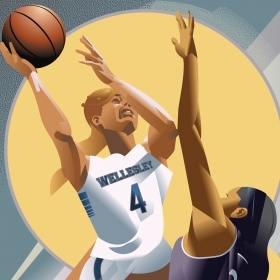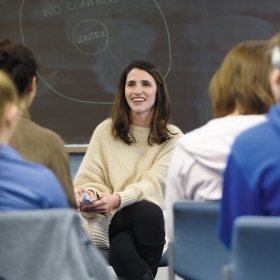Frank Poulin Photography
You could say it started with running after lacrosse balls for money. Or perhaps it started about eight years ago, when Lauren Park ’21 first picked up a saber. Or perhaps before then, when she played field hockey. Or perhaps all of those things have culminated in an interest in athletics that extends beyond competition.
“I first got involved in PERA [the department of Physical Education, Recreation, and Athletics] through a job posting. They were looking for ball runners for lacrosse,” Park says. Of course, in addition to helping out the lacrosse team, she was also a member of the College’s fencing team, and she attended other sporting events for fun. “I really loved the opportunity to be on different ends as an athlete, as a fan, and as a student worker.”
When the opportunity arose to move beyond running balls, Park jumped at it and became an event announcer, starting with volleyball games. Eventually, she also ended up doing the scoreboard for the softball team, and she is currently co-captain of the fencing team, all of which makes it not that surprising that she is spending her senior year as an intern with PERA.But it wasn’t until recently that she realized this is something she might want to pursue post-graduation.
“It wasn’t until my senior year [that] I really started getting interested in pursuing athletics as a potential career, so I reached out to the athletics department, expressing interest in working for them,” Park says. As an intern, she’s learning “more of the back end of what happens not only with athletics, but also with our PE program and recreation, as well.” Although this year is hardly a typical one for the department, she’s been able to experience a variety of activities that go beyond planning competitions. “I’ve gotten to help with logistical managing of practice sheets. I’ve been doing work on the student-athlete handbook. I’ve gotten the opportunity to work directly with the sports information director and work with information that goes directly on the website, and help out with some compliance things,” Park says. “It’s been really great to get a little bit of exposure to different things that are not just playing.”
In addition to her work with the department and the fencing team, Park was nominated to participate in the NCAA Division III Student Immersion Program this past January. The program brings a group of about 40 ethnically diverse students to attend the NCAA convention to learn more about Division III, its members, and its governance, and to create a pipeline of diverse candidates who are interested in coaching or administration. This year, the event was virtual, but that didn’t lessen its impact for Park. “I went in expecting just to learn a lot from the lectures, write a couple notes down, and kind of be done with it, but I came back with so much more,” she says. “I came back with a network. I came back with meaningful and lasting connections, and I came back with a really strong interest and desire to really further my search and dive in.”
And although things post-graduation are a bit up in the air, Park is homing in on athletics administration. “[The NCAA program] and my involvement with PERA and engagement with the Wellesley athletics community has definitely pushed my desire to really go for my passion in athletics,” she says.







We ask that those who engage in Wellesley magazine's online community act with honesty, integrity, and respect. (Remember the honor code, alums?) We reserve the right to remove comments by impersonators or comments that are not civil and relevant to the subject at hand. By posting here, you are permitting Wellesley magazine to edit and republish your comment in all media. Please remember that all posts are public.